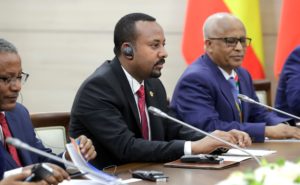Ethiopia’s Prime Minister Rebel Militia attracted a stern move by Facebook, which removed his post on their platform. His post was despised for “inciting and supporting violence,” and he drafted the post while his country was going through a period of political unrest accompanied by violence.

The post on Friday by Abiy Ahmed addressed Ethiopia’s enemies whom he vowed to “bury.” The post also stated that “The obligation to die for Ethiopia belongs to all of us.” In July, he once described Tigrayan People’s Liberation Front (TPLF) forces as “cancer” and “weeds” [Source]. Such utterances came after TPLF forces made advances towards the capital Addis Ababa. Because of this, it was believed that the PM was talking about this particular case and his post became a violent one.
Meta, Facebook’s owner, deemed it necessary to remove Ahmed’s post and announced the removal On Thursday. A statement from the company noted that “As the ongoing conflict in Ethiopia intensifies, we are committed to helping keep people safe and preventing online and offline harm through our platforms.”
Facebook explained how they were informed of the post and decided to take measures to rectify the issue. It said, “We were made aware of a post by Ethiopia’s prime minister and removed this for violating our policies against inciting and supporting violence. At Meta, we remove content from individuals or organizations that violate our community standards, no matter who they are.”
The social media platform is very popular and has vast users across the globe. Due to this, it becomes a dangerous tool if used in the wrong way. Because of its wide outreach, one can exploit that ability for selfish gains and amass followers or even start a war. These are some of the disadvantages related to social media. Notable cases of this nature are linked to former US President Donald Trump, who caused havoc on Facebook and Twitter. Trump posted that the 2020 elections were stolen from him and convinced his followers to participate in a demonstration against the American government.
Facebook, Twitter, and YouTube decided to ban him from using their platforms. Earlier this year, Facebook made a bold decision to cap individuals who use their entity to propagate hate or political views that harm the community. Nick Clegg, the former UK deputy prime minister who is now vice president for global affairs and communications at Facebook, rolled out the plan to reduce politics on people’s feed and said the strategy supported “more friends, less politics” [Source].
In light of this, it shows that Facebook is determined in curbing violence or political content being propelled by people. Under their new strategy, no one is supposed to abuse Facebook, and people must adhere to their laws.
It is against this background that PM Ahmed was found on the wrong side. Facebook whistleblower Frances Haugen blamed the company for “literally fanning ethnic violence’’ in Ethiopia because it had relaxed laws outside the American borders. But this move to block Ahmed is a good sign by Facebook in tightening the screws for users outside the US who violates the regulations.
Currently, Ethiopia is marred with gun violence between the country’s forces and the Tigrayan forces. It looks like the African nation might suffer the same fate as Afghanistan if negotiations fail. On Tuesday, the government declared a state of emergency after projecting a threat from TPLF, which was heading for the capital. A spokesperson of the forces noted that TPLF was stationed in the town of Kemise, in Amhara state, and was about 200 miles from the capital, which is their main target.
Because of this, it can be seen why Ahmed drafted such a threatening post addressing “enemies.” But his method of retaliation is against Facebook’s policies, and his post had to be removed in that regard.







































